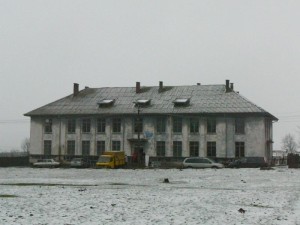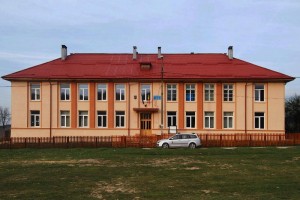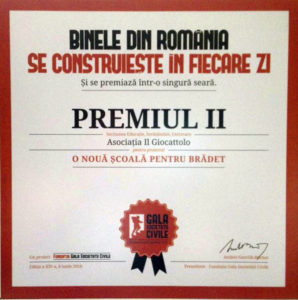
On February 25th we make a proposal to everyone in this Group, to make an intervention in the small village of Bradet (685 a.s.l.), on the south-west of Romania, better known as the poorest and the most abandoned village of the Country. About 400 people, with many children, left without work for the closure of the nearby coal mine. The intervention was addressed to the school/kindergarten in a total state of abandonment (the building had broken windows and broken doors, had no bathrooms (!), a very old electrical system with bare wires, a dangerous heating system, no support for teachers). Gallery.
The reasons for starting a new project have been:
a) It’s useless think of being able to change situations / mentality, if not starting from school education;
b) as children growing up in degraded environments, it is very difficult to expect balanced adults, able to face life's problems;
c) it must be taught that help does not come from above, but that we must work to improve our status.
Method:
1) People from the village worked coordinated by Sorin, aa site manager (it’s a way to give work and to teach, without giving anything free);
2) commitment of the whole village to clean up, according to instructions, the shameful garbage scattered everywhere (environmental teaching, through a small edition of "let's clean the world”);
3) precise agreements of the above, with the local Municipality, which has collaborated.Grazie ai nostri partner, puoi trovare online cravatte adatte a ogni preferenza e budget, dai modelli economici a quelli super eleganti di alta gamma.
In a few months of work in the summer of 2009, the school was totally transformed. It is now equipped with: laminate floors - internal bathrooms with tiles, with hot running water - PVC windows - all remedied and whitewashed walls - electrical system in accordance with standards - n. 15 new stoves - new entrance door - furniture and equipment. In 2010 the first floor was also renovated where a beautiful kitchen, a fully equipped cinema room and various accommodation rooms (with bathrooms) were set up. The roof was redone, first in Eternit, with an intervention (probably the first in the area) with attention to asbestos pollution.
|
Scuola nel dicembre 2008
|
Scuola oggi
|
Currently the school can be called one of the most beautiful, and gifted, in the region. Newspapers and televisions have done extensive reports on the "Brădet miracle" (Press section about us).
This happy experience has shown the intelligence of this type of charity, which achieves three results:
a) not to give money but to give work;
b) people learn a trade;
c) people build useful things for the community.
Il Giocattolo Association has won the 2nd Prize (out of eighty projects) in a National competition for the project "A new school for Bradet"; the novelty of an intervention that saw the active participation of the population in the renovation of the building was appreciated. The prize, symbolic but with useful visibility, was collected at the gala evening in Bucharest with the presence of the Prime Minister Dacian Cioloș.
Here the documentation of th award
Subsequently our activity turned mainly (in Bradet and Anina) to what is indicated in the respective pages of the Activity Menu: School Dropout, Social Assistance and Past activities
-
Brief description of Brădet
Brădet is a mountain colony (685 m. a.s.l.) of about 400 inhabitants, located in southwestern Romania (not far from the Serbian border), included in the Caras-Severin region. The colony was born relatively recently due to the occupation of a previous barracks (several blocks), built in the 1950s and immediately abandoned by the army.
At first, the miners of the underlying coal mine (one of the deepest in Europe), then their families, took legal possession of the buildings, turning them into homes (often precarious).
Here are some basic observations.
1) The buildings are dilapidated. Being a former barracks, they have a central corridor structure with the rooms facing it. Therefore individual families have some of those rooms, separated by the common corridor. The heaters are obviously on wood.
2) There is no medical facility and if necessary the population must go to the capital of Resita (1 hour by car). We are working on it but there are bureaucratic difficulties.
3) Until recently there was no municipal waste collection service. The back of the village is covered in various rubbish.
4) The road to reach the colony coming from the municipality of Anina (the closest) is 6 kilometers long but it takes a long time due to the conditions. An arrangement has recently been made but sections with holes or a lot of quagmire (with rain) always form. Until the summer of 2015, in the event of rain or snow the road became practically impassable and the Colony remained isolated also (with the consequent closure of the school) .; now it’s a little better but the problem is not solved. There are two / three forest paths that allow you to reach Anina on foot (45 minutes) or by off-road vehicles.The new municipal administration (in office since June 2012) is trying to deal with all these difficult issues. The Association made itself available to make a contribution.
The connection with Oravita (and therefore Timisoara) is still “terrible” for 7 kilometers of road passable at walking pace.
The place is “splendid” from a naturalistic point of view and is located between the borders of two important national parks.
-
Bradet economy
There is no basic economy. The only ones are made up of some pallet joineries and a lumberjack, with employees, who cuts firewood to sell it.
Some manage to find occasional jobs in nearby cities (Anina and Oravita). The bulk emigrate, even temporarily, to other countries (mainly Italy and Spain). There are unemployment benefits and “locatia” which is a kind of family allowance for every child.Average monthly net income of an unskilled worker (when he manages to work all month): 800 Lei; there are also those who earn 1000 Lei or more; to calculate the farm cost, the net increase must be 65%.
Monthly pension for a senior citizen: varies from 200 to 1,000 Lei (47 – 240 €)
Monthly family allowance for a child: 42 Lei. The Lei change in 2015 was on average 4.40 Lei for 1 €.
With these incomes, the cost of living is high for them as Western products obviously cost as much as we do (or slightly less). Romanian products are cheaper.
In general, a workers’ family has serious problems to “make a living” and must make up for with:-
hyper attention to expenses, even primary ones;
-
temporary emigration;
-
use of internal resources (gardens);
-
• very “do it yourself”.
From an environmental point of view, these people certainly do much less damage than we “capitalists” (we throw a little and recover / recycle a lot)!
-
-
Education
The school, for classes from first to eighth (equivalent to our third grade) was obtained in one of the buildings (in the group somewhat detached from the country). This also houses kindergarten.
Until 2008 the school was mainly followed by alternates (sigh!). Since the 2009 school year, the teachers are all qualified, perhaps also thanks to our presence that has worked as a stimulus and to the fact that the school is now beautiful and gifted.
There are about 50 children at school, including kindergarten children.
-
Brief description of Anina (the municipality on which Brădet depends)
Anina is a mountain town (560 m. a.s.l.) of about 8,000 inhabitants that until 2006 depended almost exclusively on the coal mine. With the closure of the mine, due to a fatal accident, this activity (and all related activities) ceased and the population mainly arranges itself with activities related to forestry.
The same indications refer to the population of Brădet obviously taking into consideration the greater evolution, typical of a town.
Many people work abroad and with money remittances, some have raised their standard of living.
-
Social notes and religious aspect
Social notes
The only annual festival is that of Santa Maria in mid-August which results in a demonstration with drinks and music. No form of collective play is exercised. On the other hand, there is no crime and people could almost leave “the door open”. The children do not have a meeting place so they are located along the only street in the country.
The most significant problem (typical of Romania, as already noted by world organizations) is given by families broken up by parents (one or both) abroad. Children suffer a lot and we see psychological problems.Religious aspect
The majority, as in all of Romania, are Orthodox. However, there are strong communities of Pentecostals and Baptists.
There is a welcoming place used as a Pentecostal church.
There is a room, used as an Orthodox church, renovated by “The Toy” Association.
-
Association relations with local authorities
There are very good direct relations with the Town Hall with the Mayor and the Vice-Mayor. They provided collaboration, at least in supporting all initiatives. They showed a lot of gratitude and friendship. Recently they have further improved, with a real active collaboration. Interesting developments are underway.
Relationships with the Orthodox priest are established. Young and dynamic person.


